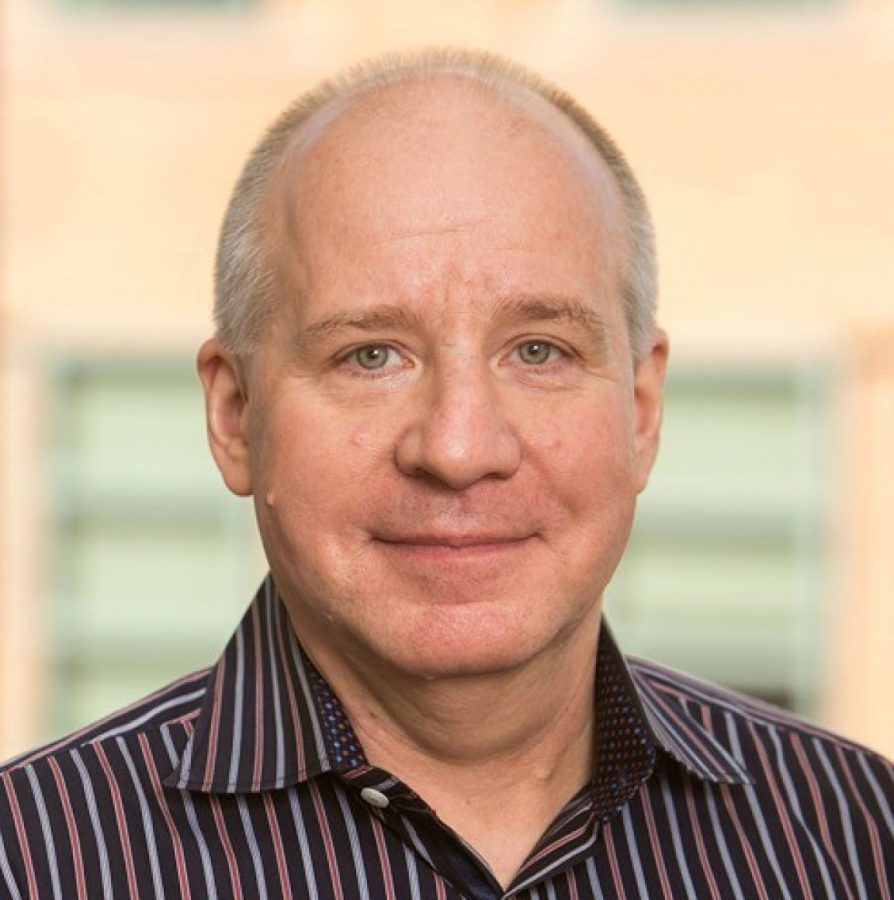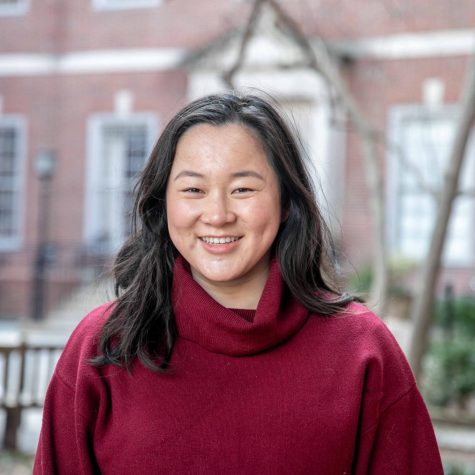From Walter Reed to Ph.D.: How a motorcycle crash catalyzed an NYU professor’s chemistry career
A motorcycle crash took John Michael Halpin out of the Army and led him toward becoming the first in his family to go to college. Five academic degrees later, Halpin is a distinguished chemistry professor at NYU and an inspiration to hundreds of students.
A portrait of Dr. John Michael Halpin. (Photo courtesy of John Michael Halpin)
August 30, 2021
With only six and a half months left of his time in the U.S. Army, John Michael Halpin woke up in a hospital bed at Walter Reed Medical Center with a shattered left wrist, fractured pelvis, broken shoulder, head trauma and abdominal lesions from surgeries.
His motorcycle had collided with a telephone pole as he headed back to the base on a typical off-duty night in the 1970s with a couple of friends. He drifted in and out of consciousness for days, not waking up until a week after the crash.
“I can remember being woken up a couple of times and not really knowing where I was or anything like that. It was a gradual thing,” Halpin said.
Recovery is still ongoing, according to Halpin. Nerve damage and restricted movement in his wrist still prevents him from performing tasks like lifting heavier objects with his left hand. Scars cover his abdomen as a result of surgery on a damaged intestinal tract. As he reflects on his time in Walter Reed, he remains grateful for his successful surgery.
“I was in the hospital with another victim of a motorcycle accident who lost both his legs,” Halpin said. “You know, I was extraordinarily lucky.”
The recovery period consisted of surgeries and waiting as he transitioned back and forth from the main hospital to a second facility a few miles away. Halpin spent months alternating between the two facilities with nothing but books to keep him company.
“It pretty much sucked,” Halpin said. “It was very painful. It was kind of a lonely time.”
Lying awake in the hospital, he began contemplating his future. Without the Army, what was he supposed to do now?
***
Halpin decided to join the Army after graduating high school. At first, it was just an occupation he settled for. The role was something different from the shifts he used to work at grocery stores and gas stations.
“The Army seemed like a good way to move forward,” Halpin said. “It turned out that it was, though not in the way I had foreseen.”
Throughout his youth, Halpin’s family never emphasized the importance of education. Instead, they believed that with the arrival of high school graduation, job hunting began. As a result, Halpin was surrounded by the mindset that he would have to always dread going to work, as had been his parents’ experience. He didn’t fully grasp the true meaning of a career at that time.
Now a professor at NYU, Halpin teaches general chemistry to first-year students, but it was not an easy journey for him. From the outside, he appears like any other professor as he travels from lectures to meetings and works on his administrative duties. However, he comes from a background that is a bit different from most of his peers in higher education — Halpin is a first-generation college student.
“Things changed as I got into academia and immersed myself in my education, and then that turned into graduate school. And that turned into teaching at the university level,” Halpin said.
***
Halpin entered vocational rehabilitation for his undergraduate degree soon after his accident. To prove he was ready for college, he took remedial classes through an individualized employment program for workers with disabilities. The program covered his educational costs and provided him with a living stipend, an opportunity that was more important to him than any rehabilitation he was undergoing.
After spending two years at Hudson Valley Community College and one year at Rensselaer Polytechnic Institute, Halpin transferred to NYU.
At this point, Halpin was taking classes in math, physics and chemistry. During his senior year at NYU, Halpin conducted undergraduate research for a young assistant professor and decided that he wanted to continue working for him after completing his undergraduate degree. He applied for graduate school at NYU and was accepted.
Unfortunately, during graduate school, the young assistant professor he was working for was denied tenure and left NYU, forcing Halpin to switch graduate advisors. Despite the sudden change, he was still grateful to his new adviser for accepting and teaching him. His undergraduate years had involved many transfers between schools, but graduate school allowed Halpin to focus on the subject he loved and meet people with similar interests. One of them would become his wife. They now teach chemistry together.
Initially, Halpin aspired to be a chemical engineer. As he took more science courses, though, he began to see how much his professors enjoyed the work that they were doing.
“I realized the engineers weren’t having as much fun as my college professors,” Halpin said. “My chemistry professors would be there at 8 o’clock and they were 75 years old and hadn’t left yet. I want to be 75 years old and not want to quit either.”
During graduate school, Halpin juggled working as a TA at NYU along with teaching positions at Long Island University in Brooklyn, the Borough of Manhattan Community College and a tutoring center.
Working with his tutoring students spurred his development as an educator, forcing him to study harder and get better at explaining concepts. The instant feedback students gave him ensured that he knew right away when his teaching wasn’t effective.
“These kids weren’t afraid to tell me what they thought,” Halpin said. “One of them would look at me and say, ‘You don’t know what the hell you’re talking about.’”
Becoming a professor had not been among Halpin’s aspirations, but the path he took and the decisions he made led him to teaching.
***
His interest in chemistry persisted throughout his academic journey. He completed his master’s in chemistry, then a chemistry Ph.D., then a master’s in science education. The university was also a consistent presence; Halpin received four of his five degrees from NYU and was made a clinical professor in the NYU chemistry department.
Since then, Halpin has received extensive recognition for his teaching, including the NYU Distinguished Teaching Award in 2017. It began, though, with the education he began to pursue after the crash.
Halpin says he owes the first foundational step of his first-generation story to his motorcycle accident. He believes that, while random events like his will happen in life, it’s how you turn those events around that makes you who you are. Being a disabled veteran could have been no more than a hardship, but this status allowed him to access educational opportunities that completely transformed his life.
“He had the ability. He had the skill set, and he pursued it,” Donald McManus, a New York state vocational rehabilitation counselor, said. “If you don’t have a certain passion about what you want to do, what’s the point?”
With the possibility of new financial aid from the government, nothing stopped Halpin from pursuing an education.
“You’re not telling the story of a veteran,” McManus said. “You’re telling the story of a human being, who made his life choices.”
***
When first-year NYU students attend their first day of class with Professor Halpin, it’s incredibly powerful for them to learn that their professor was a first-generation college student. Talking about his accident and academic journey allows him to connect with students.
“It’s in sharing these stories and experiences that it creates these connections that otherwise would have never existed,” said Deana Stafford of the Center for First-generation Student Success. “And so in Professor Halpin, leading with agency around his experience, it provides not only an example but [an] opportunity to students who might find themselves in a similar position.”
In a small Zoom window, Halpin teaches general chemistry to an audience of 700 undergraduate students. Even through a virtual setting with such a large class size, Halpin still manages to leave a lasting impact on many of his students.
Emily Zhang, a former student of Halpin’s, believes that his experiences contribute to the quality of his character. Being a first-generation college student allows Halpin to understand where many students come from and the difficulties they may face, and Zhang remembers how inspiring it was to hear that her professor was first-generation.
“Dr. Halpin is so loved by his students because of his compassion and forgiveness,” Zhang wrote in an email. “He is very understanding of the difficult nature of college courses and gives his students second chances to succeed. I think his story is very inspiring and shows that even in the face of adversity, we should persevere and stay optimistic.”
“By no means would I say it was a good thing that Halpin went through the ordeal, but what is good, what we as students and colleagues take with pride, is the extraordinary devotion to learning, chemistry, and his career that has brought Halpin to where he is today and is what radiates from him every day on the NYU campus,” Adhithya Vijayathevar, another of Halpin’s former students, wrote.
Though the motorcycle accident could easily have been much worse than it was, Halpin looks at it in a different light. If it weren’t for the collision, he wouldn’t have received life-changing educational opportunities.
“I realized that in life, a degree would mean something,” Halpin said. “Little did I know that the college education would change my entire perspective on life and my entire perspective on the world — it’s much more than getting a degree.”
To him, being inquisitive about the world around you is the most important part of education.
“I am totally interested in learning things for the rest of my life,” Halpin said. “I enjoy even the most trivial things, like watching water boil, because I understand what’s going on at the molecular level. It just changes you. And that’s what was important. It made me into a more perceptive, deeper-thinking, happier person.”
A version of this article appears in the Monday, August 30, 2021, e-print edition. Contact Ivy Zhu at [email protected].

























































































































































